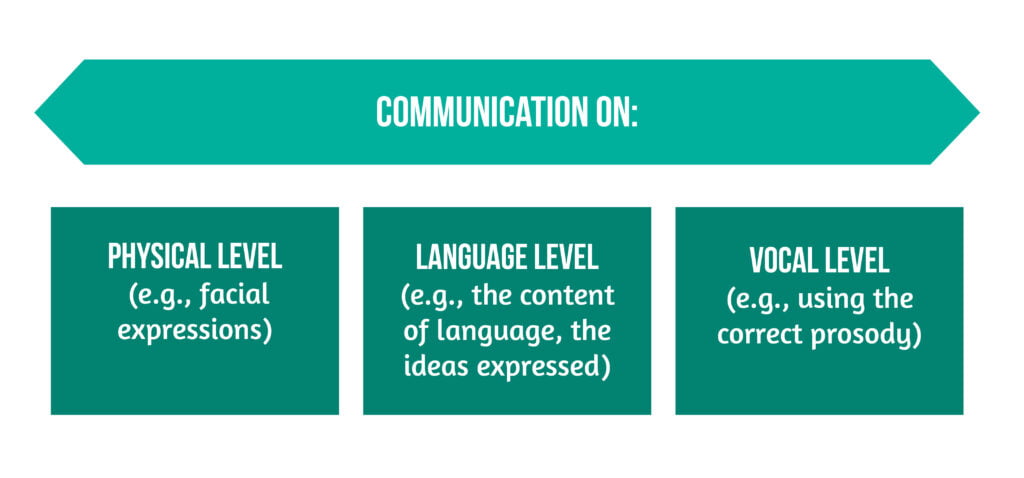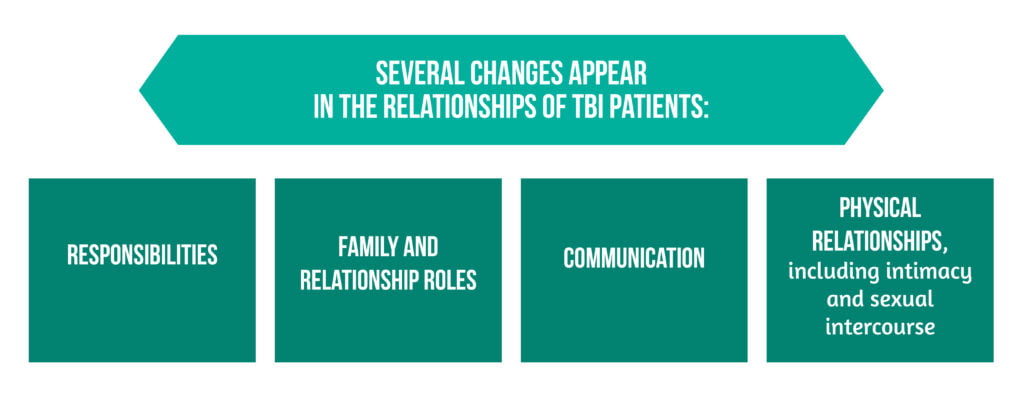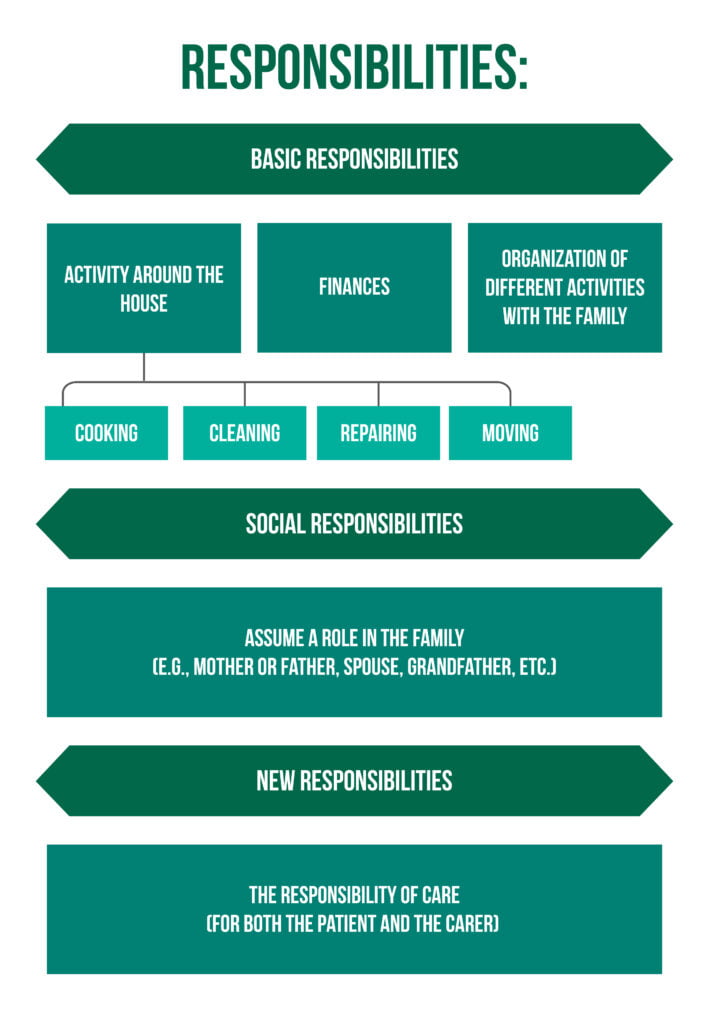Keywords: TBI, family, caregivers, relationships
Introduction | TBI impact on relationships
TBI is a major cause of disability and death in accordance with the severity. The consequences of TBI impact on relationships vary greatly, from physical to cognitive, psycho-emotional, and behavioral. These constitute obstacles to regaining the ability to lead a happy and fulfilling life by affecting the social, vocational, and educational aspects, as well as the reintegration into the local community. One significant barrier that critically impacts the quality of life of TBI patients is constituted by the changes regarding interpersonal relationships, affecting not only family life but all interpersonal social relationships [1,2].
A significant aspect of the rehabilitation and reintegration of a TBI patient, leading to a better and more satisfying quality of life, is represented by the ability to function psycho-socially [2].
TBI impacts the patients’ ability to communicate emotionally, leading to a disability in identifying and showing emotion. TBI affects communication on several levels, as showcased in Figure 1.

For more information about the impact of TBI and perspectives of neurotrauma care, visit:
- Humanization in neurotrauma and neurocritical care: treating the individual, not only the disease
- The importance of prehospital care for severe TBI
- Low energy falls and TBI
Furthermore, check out our interview from the second edition of NTSC:
What are the changes in relationships post-TBI?
One crucial aspect influencing interpersonal relationships of post-TBI is behavior change. Usually, this change can be easily identified by the family. Unfortunately, this significantly impacts couples’ relationships, responsibilities, and family dynamics due to the changes in the roles that need to be assumed. Relatives of TBI patients, especially spouses, might feel that their loved one has changed post-TBI. They might not recognize behavioral traits, worries, or even limitations. This is one of the reasons why it is of utmost importance to inform patients’ relatives of the consequences that can appear after TBI. Additionally, considering the dynamic changes in the family, spouses must adapt to the new challenges, ranging from the ones experienced by the TBI patient (physical, psychological, and social) to taking on new responsibilities and finding solutions to the newly encountered problems and challenges.
The intimate relationship goes through significant changes, with TBI impacting several aspects of life and leading caregivers to focus on new challenges, often leading to increased anxiety and distancing due to unawareness of the other’s expectations. Several changes appear in the relationships of TBI patients, as highlighted in Figure 2.

An important aspect is that the TBI patients, as well as their caregivers, have to receive guidance and support. The emotional effects of TBI are also mirrored in the caregivers, with the health and comorbidities of TBI patients significantly impacting the burden of caregivers. Consequently, these affect not only the relationships but sometimes also their health [4,5].
What are the roles and responsibilities of the caregivers?
In every family or relationship, each partner has their own responsibilities, as showcased in Figure 3.

Every TBI patient needs a period of recovery. Unfortunately, this leads to a significant shift in relationships due to the necessity for the other to take on new responsibilities while also adapting to the situation (sometimes disabilities). This frequently leads to anxiety and differences in the couple.
What can be done: It is usual for people to feel anxious when they are taken out of their comfort zone. All these changes take both partners out of their comfort zone. However, an important step forward is represented by constant communication and understanding. Partners ought to discuss, share, and explain the situations and reasons that lead to stress, differences, and conflicts. This represents a way to ease and ensure a better adaptation for both parties.
Relationship roles are unique to everyone, with some partners taking leadership roles. The tricky part of role change is represented, on the one hand, by the severity of the TBI and its consequences and, on the other hand, by the dynamic roles of the relationships, which, if at first seem to be temporary, in time, can become permanent.
Some aspects of the relationship’s dynamics increase the duration of adapting to the new situation. Adaptation might be more difficult in the case of:
- new couples
- couples with young children
- recently married couples
- independent partners with separate activities and responsibilities
What can be done: One important step is redefining the roles and simultaneously creating a supportive relationship between partners, based on constant feedback. Additionally, it is essential to avoid criticism and offer understanding to the other partner. During the adaptation phase, proper communication and acceptance are fundamental pillars of a good relationship. Lastly, children need to be informed of the changed family dynamics and the new situation, the consequences, and the needed adaptations should be adequately explained. The process affects all family members, including children, so the task of adults is to ensure a calm and secure environment for them regardless of the new challenges, to avoid a possible negative emotional impact.
How does communication impact relationships after a TBI?
Human beings are social creatures; thus, communication represents one of their essential characteristics. Communication, in all its forms (physical, verbal, and behavioral), is one of the pillars of a good relationship. In relationships impacted by a partner’s TBI, communication is often impacted at first. It can become a problem due to the post-TBI disability (e.g. impaired language, cognitive impairment) or the need for adapting to the new situation. In some cases, communication becomes difficult, with the loved ones not knowing exactly how to communicate appropriately. Moreover, the partners frequently do not want to bring additional burdens to one another, thus leading to a decrease in communication to avoid talking about negative aspects.
What can be done: With patience for the other, the emphasis needs to be settled on improving the communication to assure the other about the continuing commitment. This is done by listening to the partner while focusing on the positive aspects. These differences have to be taken one by one and discussed calmly. Sometimes exercising a conversation out loud or writing down some ideas before the conversation can be helpful. There is significant heterogeneity when it comes to ways of communicating between partners. Still, it is essential not to forget that in some cases, a therapist or support group, on-site or online, can be an essential help.
How does TBI impact intimacy in relationships?
Intimacy is vital in every relationship. However, it can be significantly impacted after a TBI, as it can impact physical appearance, self-confidence, sex appeal, and dynamics.
What can be done: In addition to open and thoughtful communication, therapy can help by providing counseling for intimacy-related difficulties and the context of TBI. There are specialized therapists for TBI patients. An alternative or addition to therapy can consist of support groups, whether online or on-site, as they provide not only information but also a place to share one’s experience and discuss difficulties and ways of overcoming them.
The impact of TBI on a relationship, whether in the case of new couples, unmarried couples, married couples, and extended families, is underestimated, requiring a long-term commitment for everyone involved. That is why help is needed to ensure better understanding and adaptation to the new dynamic and fight the consequences of TBI [1,3].
Assuring proper communication, adapting family roles and responsibilities, and addressing intimacy problems, combined with external help (therapy or support groups), should ease the burden and improve the quality of life of both partners and families and, at the same time, support successful healing. Furthermore, it is of utmost importance to address the challenges of both partners since the caregivers are indirectly impacted by the TBI [1, 3–5].
References
- Godwin E, Kreutzer J, Kolakowski Hayner S. Model Systems Knowledge Translation Center, Couples’ Relationships After Traumatic Brain Injury. Available at: https://msktc.org/tbi/factsheets/relationships-after-traumatic-brain-injury
- Wauters L, Marquardt TP. Disorders of Emotional Communication in Traumatic Brain Injury. Semin Speech Lang. 2019;40(1):13-26. DOI: 10.1055/s-0038-1676364.
- Delgado RE, Peacock K, Elizondo B, Wells M et al., A Family’s Affair: Caring for Veterans with Penetrating Traumatic Brain Injury. Mil Med. 2018;183(suppl_1):379-385. DOI: 10.1093/milmed/usx156.
- Malec JF, Van Houtven CH, Tanielian T, Atizado A, Dorn MC. Impact of TBI on caregivers of veterans with TBI: Burden and interventions. Brain Inj. 2017;31(9):1235-1245. DOI: 10.1080/02699052.2016.1274778.
- Godwin E, Chappell B, Kreutzer J. Relationships after TBI: a grounded research study. Brain Inj. 2014;28(4):398-413. DOI: 10.3109/02699052.2014.880514.




